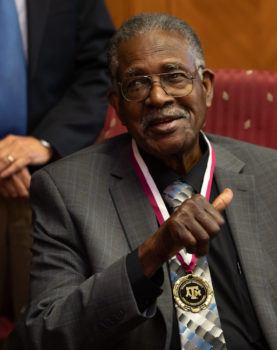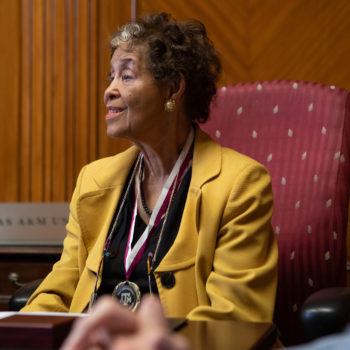Two Former Students Receive Texas A&M’s Pioneer Medal
On the 65th anniversary of Brown v. Board of Education, one of the first African Americans accepted to Texas A&M University and the first African American student to receive a doctorate were honored with the Pioneer Medal.
Texas A&M President Michael K. Young presented the award, which honors African Americans admitted to the university between 1963 and 1970, to Leroy Sterling and the late James Johnson. Accepting on behalf of Johnson, who died in 2017, was his wife, Katie Francis Johnson.
While the U.S. Supreme Court ruled unanimously in Brown v. Board of Education of Topeka, Kansas that segregation in public schools violated the Constitution, integration at Texas A&M didn’t begin until several years later. In 1963, World War II hero and then-president Gen. Earl Rudder opened the university’s doors to minorities and women. Three black students enrolled in the first 1963 summer session, becoming the first to attend Texas A&M.
“It is our great honor to bestow Pioneer Medals to Leroy Sterling and posthumously to James Johnson who as educators used what they learned at Texas A&M to better the world around them,” Young said. “Despite the difficulties they faced when they enrolled they succeeded and showed the power of an A&M education, combined with their great fortitude, to change the world.”
Sterling, one of the first three black students to enroll, said it was an honor to receive the Pioneer Medal. While he would later go on to graduate from Texas Southern University and earn a master’s degree in French and English from the University of Houston, Sterling studied at Texas A&M during two summer sessions in 1963.
Sterling noted that he began taking classes not long after former Alabama governor George Wallace gave his inaugural address famous for the phrase “segregation now, segregation tomorrow, segregation forever,” and said he and the two other black students enrolled “quietly.” Sterling described his experience at Texas A&M as positive overall.
“Having been on campus, the students were really nice and they would come up to me and befriend me,” Sterling said.
Katie Francis Johnson said her late husband would have been “proud, but not boastful” to receive the honor from Texas A&M. James Johnson applied to Texas A&M multiple times through the 1940s to the 1960s, but was turned away due to segregation. He went on to become the first African American to receive a doctorate from the university in 1967.
“It was as though God had dropped this in his lap, and he was determined to do the very best that he could, because he was the first to enroll here on the graduate level,” Katie Francis Johnson said. “He worked very hard, I think, being the only black. A lot of the students met him and knew him, and then loved him because of his kindness, his compassion, all of those things.”
Johnson, a Rockdale native, attended Prairie View A&M starting in 1944. He was drafted into the Armed Forces and performed police duties in the Army until he was honorably discharged in 1948, after which he finished his bachelor’s degree in education. He went on to earn a master’s degree from Prairie View in 1962, before finally receiving his doctorate in education from A&M. Johnson joined the Prairie View A&M faculty, and later transferred to Texas Southern University, where he retired.
Also a vocational agriculture teacher for Bryan ISD, among Johnson’s students was Sterling, who called Johnson a role model and a friend of more than 60 years.
A native of Bryan, Sterling served in the Army and enrolled at Texas Southern University before he began taking summer classes at Texas A&M. When he applied for enrollment, Sterling said, he wasn’t surprised when he first received a rejection letter. A few weeks later, though, he learned that the university decided to accept him. Sterling taught at Texas Southern University for five years before working for Dow Chemical Company for 17 years. He continued his teaching career at Alabama A&M University.
Llewellyn A. Derry, president of the Black Former Student Network, said Sterling and Johnson’s enrollment not only opened a door, but provided a “destination” for future African American students.
“They went from the door to the destination – Texas A&M credentials afforded them a lot more value in the marketplace than if they had not come here back in the ‘60s and ‘70s,” Derry said.
The Pioneer Medal was first awarded to 16 recipients in 2013, which marked the 50-year anniversary of Texas A&M’s admittance of African Americans and women. Six more pioneers – including the first African American woman to graduate from the university – received the honor in 2017.
Media contact: Lesley Henton, 979-845-5591, lshenton@tamu.edu.







